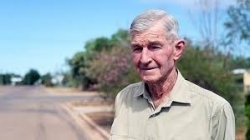"What we saw in the main hall of the Winton Shire Council on Friday simply defied all description: a room filled with hundreds of broken and battered refugees from our own country."
- Dr. David Pascoe
Quite recently, Dr. David Pascoe, a veterinary surgeon from Queensland, Australia, has made headlines after writing a public letter to the Australian people and releasing it on the internet via social media. In that letter, which has now gone viral, Dr. Pascoe takes the private banks to task for the horrible treatment that they have meted out to drought-stricken farmers in the northwestern part of the state. It may be read in full here: http://pickeringpost.com/story/bastard-banks/4237 or on Dr. Pascoe's own facebook page: https://www.facebook.com/OVHRepro.
In brief, the situation is as follows: drought conditions have depreciated the value of farmland and certain Australian banks have been taking advantage of the situation in order to foreclose on farmers that they now consider to be unviable risks ... even though some of these farmers, like 87 year-old Charlie Phillot (see photo above), have never missed a mortgage payment to date. Due to widespread unawareness regarding financial matters, it is not surprising that Charlie believes that what has happened to him is his own fault, nor that his bank, the ANZ bank, has made sure to reinforce that erroneous belief. To make matters worse, Pascoe suspects that the farmers are being moved off of their land so that the banks can then sell that land to either foreign mining companies or Chinese investors. He describes what has been happening in terms of corporate terrorism: ordinary Australians are being bullied, threatened and abused to make straight the path for big business. Some farmers have lost property that was in their families for generations; others have been driven to suicide.
Thanks in large measure to the public exposure which Dr. Pascoe's letter has received (the mainstream media had been ignoring the issue), it would appear that the banks in question are now moving to ease the burden on farmers ... somewhat. The ANZ bank, concerned no doubt about its public image, has placed a 12 month moratorium on foreclosures. Such responses are, as Pascoe himself acknowledges, only a start. They do not provide an ultimate solution to the financial difficulties which farmers face, difficulties that persist even in relatively 'good' economic times or favourable weather conditions.
In truth, this latest incident is but one manifestation of a much deeper and extensive problem with the existing financial system. Almost a century ago, the Anglo-Scottish Engineer, Clifford Hugh Douglas (1879-1952), put his finger on the core of the trouble: the banking system is run as a private monopoly. That monopoly takes advantage of an endemic gap in the economy between consumer prices and consumer incomes in order to progressively transfer wealth, privilege, and power into fewer and fewer hands. The chronic lack or deficiency of consumer purchasing power both occasions the contracting of additional debts from the banking system (the only source that can provide them) and makes it difficult (if not impossible) for people to pay them off. Douglas pointed out further that the only real solution to this problem was a radical reform of the monetary system. The recurring macro-economic gap must be filled with fresh money that would be created debt-free and be distributed equitably to individual citizens. The transformation of society into a gigantic profit-sharing co-operative would simultaneously restore a real or self-liquidating balance to the circular flow. Artificial financial pressures would be eliminated and people could breathe freely once again.
If Australians like the good Dr. Pascoe want to solve the problem once and for all, not only for the farmers, but for all of Australia's people, they need to bring the private banks and the government to the table publicly and to tell them in no uncertain terms that from now on the banking system in Australia must operate for the common good of each citizen; i.e, it must operate in accordance with Social Credit principles (Social Credit being the name given to C.H. Douglas' economic, political, and cultural ideas).
Thankfully, Australians need not start from scratch when it comes to organizing themselves in the fight for the establishment of a Social Credit Commonwealth. The Australian League of Rights, founded by the late and great Eric Butler, has been tireless in its promotion of Social Credit for many decades. Educational efforts and grassroots activism have yielded much fruit, but the final battle has yet to be fought. The League's website, which contains a great deal of highly relevant information on the cause and the cure of social dysfunction, may be accessed here: www.alor.org
A brief introduction to Social Credit: http://www.michaeljournal.org/bridger.htm
See also David Pascoe's interview with the Australian Broadcasting Corporation: http://www.abc.net.au/news/2014-12-18/bank-anger/5975078.




